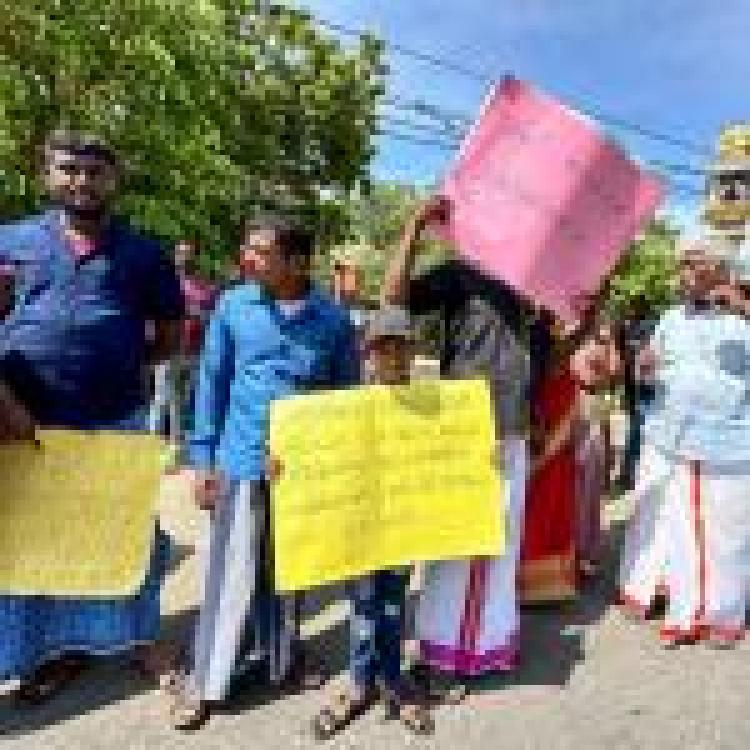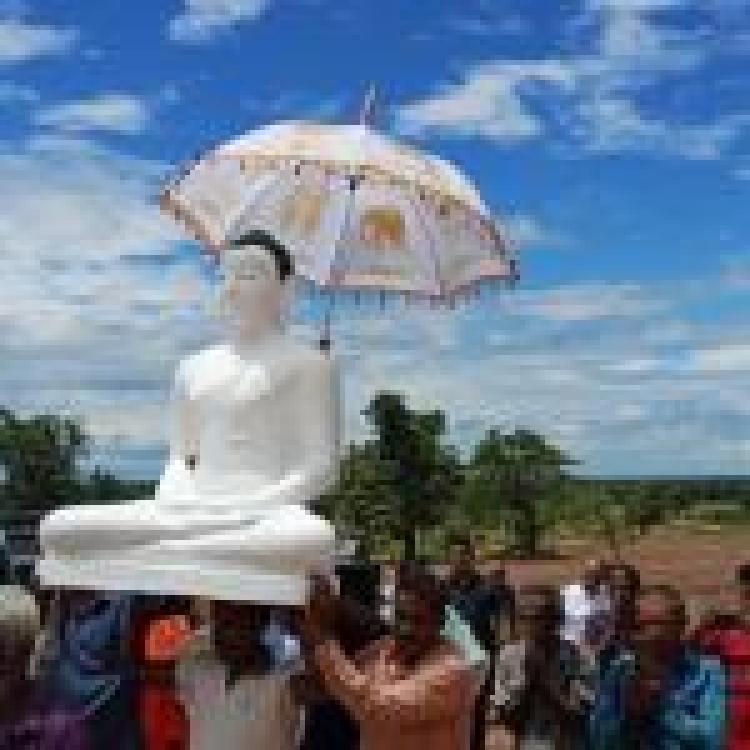In the Mayilathamadu Madhavanai area in Batticaloa, tensions are escalating between Sinhalese occupiers and Tamil cattle farmers, as a disturbing trend of brutal attacks on cattle by Sinhalese settlers continues to unfold. The situation, which poses a direct threat to the livelihoods and safety of Tamil farmers, has reached a critical point.
In a recent video documenting the aftermath of yet another attack, a distressed Tamil cattle farmer describes the harrowing incident where his cattle was stabbed overnight by Sinhalese occupiers. The farmer expresses deep concern about the future, stating,
What was done to this cattle will soon be happening to us (Tamil cattle farmers).
He goes on to claim that the settlers are not only targeting their livestock but are also making explicit threats to the lives of the Tamil farmers themselves.
They (Sinhalese settlers) are going to stab and kill us very soon, too!
We need an immediate indication of whether there will be a solution to this,
he implores.
The video further reveals the challenges faced by Tamil farmers, including the installation of wired fences by Sinhalese settlers to prevent cattle from entering their land. The farmer narrates a situation where heavy rainfall and the presence of elephants forced them to seek refuge, only to return and find their cattle stabbed after crossing the wired fences. The lack of a designated area provided by the state for tying cattle adds to the difficulties faced by the Tamil farmers.
Over the past few months, there has been a disturbing pattern of violence against the cattle of Tamil farmers, with Sinhalese settlers accused of not only harming livestock but also encroaching on the land owned by the Tamil community. This encroachment not only threatens the livelihoods of the Tamil farmers but also endangers their lives.
Expressing frustration and despair, the Tamil farmer in the video warns that if the state continues to neglect their pleas and enables the actions of the Sinhalese settlers, they may be left with no alternative but to take drastic measures. "If the state continues to neglect us and to enable the actions of these settlers, we will have no choice but to kill ourselves," he grimly declares.
The escalating tensions in Mayilathamadu Madhavanai highlight the urgent need for intervention and resolution to protect the lives and livelihoods of Tamil cattle farmers. The state must address the grievances of the Tamil community, provide a safe environment, and prevent further violence and encroachment by Sinhalese settlers to ensure the rights and lives of Tamil farmers are not further affected.
In the video below, the same Tamil farmer points at his other cattle which had its leg slit overnight by Sinhalese settlers a couple of weeks ago. He shares the uncertain future and distressing realities he and similar farmers are constantly facing as a result of illegal Sinhalese settlement on their lands.
This is a "form of ethnic cleansing" by the Sri Lankan state - TNPF leader
In an exclusive interview with the Tamil Guardian last month, Tamil National People's Front (TNPF) leader and MP Gajendran Ponnambalam discussed the Sri Lankan state's role in the ongoing atrocities against Tamil livestock farmers by Sinhalese settlers in Mayilathamadu and Madhavanai. He states that the Sinhalese settlement in the said area is part of the China-funded Maduru Oya Right Bank Development Project.
According to the MP, the Project should ideally be profiting the Tamil people in the Batticaloa district areas as a result of the lands that are demarcated as 'grazing land' for 300,000 cattle. Ponnambalam opines that the demarcation as grazing land would have become highly "profitable due to farming, irrigating schemes etc.". Ponnambalam further said,
However, the Sri Lankan government "has secretly been bringing in Sinhalese corn cultivators from the Polonnaruwa district over to the Batticaloa district, into these grazing lands and forcibly taking over those lands, and thereby, shrinking those grazing land areas that traditionally Tamil cattle farmers have been frequenting. As a result, it's broken out into an outright confrontation, where when the cattle farmers bring their cattle, the cattle go into these farms and eat the corn. As a result, the Sinhalese corn cultivators have been killing the cattles, and now they have gone much further and have been harming the farmers themselves.
What the (SL) government is doing in the name of irrigation is actually a form of 'ethnic cleansing',
the MP added.
Despite last month's protests by aggrieved Tamil cattle farmers and their families against the violent Sinhalese settlement, and the killing and harming of the farmers' cattle by the settlers in Mayilathamadu Madhavanai, the state has done little to heed their calls to protect their rights.


